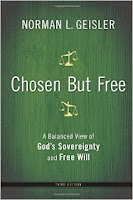God's Existence, Science and Faith, Suffering and Evil, Jesus' Resurrection, and Book Reviews
Book Review: Creating God In The Image of Man
Introduction
Creating God In The Image of Man by Norman Geisler is a book focusing on the debate about Open Theism (called "neotheism" in this book). I've been going through some of the different views on the relationship between God's sovereignty and man's free will. Open theism is one of the options that falls on the extreme side of Arminianism.The book is a short read at 145 page divided into seven chapters. Geisler includes two short appendices and a glossary for quick reference of terms used.
Chapter 1: The Chief Competitors to Christian Theism
In Chapter 1 Geisler explains why there are so many different worldviews and briefly looks at eight primary positions relating to God. These include: theism, deism, finite godism, atheism, pantheism, polytheism, panentheism, and neotheism (open theism). He explains that beliefs about the world have major consequences for how we act and uses a chart comparing theism, pantheism, and atheism to each other to illustrate the vast differences in beliefs.
Find other posts related to:
Aminianism, Book Review, Neotheism, Norm Geisler, Open Theism, Panentheism, Theology
Can Religion Be Tested for Truth?
Many years ago, I would not have even thought to ask if religion can be tested for truth. I never thought much about it, because the obvious answer to me seemed to be "Yes". Apparently, though, many people are questioning whether religion can be tested for truth today. Some even say that religion can't be tested, thus such a term as "true religion" is an oxymoron. A common slogan that I hear is, "You can't put God in a test tube". I thought that I might take a few minutes to break this down and form some kind of defense for the idea that religion can be tested.
Subscribe to:
Comments (Atom)



